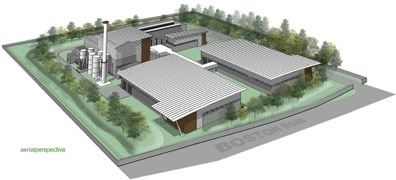Eco2 Biomass to build 40MW biomass power plant in the UK

Public consultation
Two public exhibitions held at the end of July, showed considerable support for the project. Surveys revealed that almost 90% of people were concerned about the effects of global warming and felt that action needed to be taken. In reference to the project itself, over half of those who attended the public exhibitions, were in support of the plant, while 22% were neither in favour nor against the project. Two thirds of all who attended believed that the project would have significant environmental benefits.
However, the BBC reports that a 'not in my backyard' sentiment, that plagues so many renewables projects, has now emerged. Some local citizens fear lorries bringing the straw to the plant would clog local roads. Moreover, the main building would be built close to the local football club's ground and would be the equivalent of a 12-storey block of flats. The station's architectural and landscape design has been conceived in such a way that it blends in with the environment, using 'sympathetic' materials, layout and colors - the developers say.
Wind turbines, biomass power plants and nuclear facilities - renewables and clean energy sources that can help tackle climate change - increasingly face tough questioning from locals whose immediate environment is often impacted by such facilities. However, a public consultation process often succeeds in convincing the citizens of the benefits of the project and of the larger context in which it must be placed. Still, public consultations and thorough social impact assessments remain a sine qua non for the long term success of any type of large industrial project.
Andrew Toft, commercial director for Eco2, said he welcomed tough questions being asked:
This is part of the democratic process that we have to go through. We submitted our proposals in July and an online poll showed 77% in favour. The difficulty is that as time goes on the people who think it's a good idea fall away and those who are against it come forward.The public exhibitions gave members of the community the opportunity to ask Eco2 Biomass’s project team questions about the project and have a look at the proposed plans for the plant:
 energy :: sustainability :: biomass :: bioenergy :: straw :: climate change :: public consultation :: social impact assessment :: United Kingdom ::
energy :: sustainability :: biomass :: bioenergy :: straw :: climate change :: public consultation :: social impact assessment :: United Kingdom :: Many who attended felt that their questions had been answered and that they had a better understanding of the importance of the project, ECO2 says. From its perspective, it learned a lot about what concerns the community have about the project and the developers are confident that the planning application deals with those issues fully.
The plant will would be built on Boston Road, to the east of Sleaford in Lincolnshire, and will be designed to generate renewable electricity by burning straw in a highly efficient, clean combustion process. Operation will take place continuously throughout the year and is expected to export over 300,000 MWh of green energy into the local grid.
The fuel supply chain for the plant is expected to inject over £6m a year into the region, and the plant will create approximately 80 jobs - 30 of which will be created in the direct running of the plant and a further 50 in regards to fuel supply.
This biomass plant is the flagship development for Eco2 Biomass. Considerable effort has been put into the design of the plant, which features a high quality architectural treatment using sympathetic materials enhanced by landscaping and extensive planting of indigenous species.
The application for planning permission was accompanied by a full environmental statement covering all aspects of the plant including transportation, landscape and visual impact, ecology and nature conservation, noise, air quality, archaeology and heritage.
References:
Eco2: Planning application submitted for new biomass renewable energy facility in Sleaford - September 11, 2007.
BBC: Straw power plant sparks dispute - November 16, 2007.
Sleaford Renewable Energy Plant, dedicated project website.
 --------------
--------------
 Timber products company China Grand Forestry Resources Group announced that it would acquire Yunnan Shenyu New Energy, a biofuels research group, for €560/$822 million. Yunnan Shenyu New Energy has developed an entire industrial biofuel production chain, from a fully active energy crop seedling nursery to a biorefinery.
Timber products company China Grand Forestry Resources Group announced that it would acquire Yunnan Shenyu New Energy, a biofuels research group, for €560/$822 million. Yunnan Shenyu New Energy has developed an entire industrial biofuel production chain, from a fully active energy crop seedling nursery to a biorefinery.








0 Comments:
Post a Comment
Links to this post:
Create a Link
<< Home